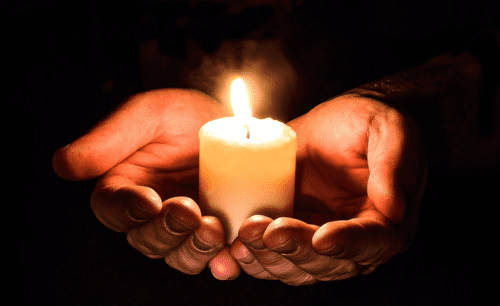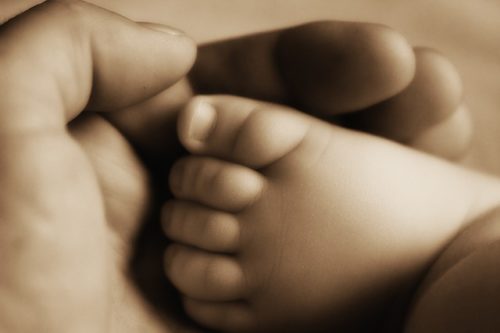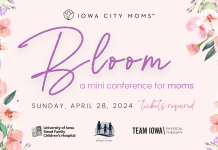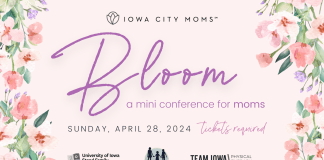Our culture treats pregnancy and pregnancy loss in such a strange way. The common practice is not to share your news until 8 or 12 or 16 weeks, or whatever point each individual person feels “safe” that nothing is going to go wrong. But the sad truth is that things sometimes do go wrong, through no fault of anyone involved. We often have no way of knowing or predicting when pregnancy loss, miscarriage, or infant loss might happen.

October is Pregnancy and Infant Loss Awareness month. The best available statistics tell us that 1 in every 4 women will experience a miscarriage, stillbirth, or infant loss at some point in her life. It’s a tragic club that no one willingly joins.
No matter how it happens or when it happens, miscarriage or infant loss can be one of the hardest things that a woman can go through.
Every woman who has experienced miscarriage has her own story. You can read my story here or the lessons another blog writer discusses from her experience here. I experienced many hardships both during and after our pregnancy loss. Some were things that I expected and could easily understand, but these three hardships were things I was not prepared for.
Whether you’ve gone through miscarriage yourself or are reading so you can understand what some of your friends may have experienced, I hope sharing these experiences can help.
3 Unexpected Hardships of Miscarriage
Physical Hardship
Having a miscarriage can physically hurt: before, during, and after. I had several days of pretty intense cramping, followed by an evening of pretty intense pain when everything actually passed. Then afterwards I had several weeks of loose ligaments, phantom pains, cramps, and other discomforts as my body tried to figure out in hormonal terms what the heck had just happened. I couldn’t stand or sit for very long periods of time, and cramping kept me from sleeping well.
One of my friends (who is a doula and very knowledgeable about such things) told me that there is nothing more disrupting to the female body than the change associated with going from being pregnant to not be being pregnant. When this happens with a birth there are all kinds of natural balancing factors as your hormone levels change and return to normal, plus you are engaged with all of the things that come with a newborn baby. When this happens with a miscarriage, or other pregnancy loss, those factors aren’t there, making the shift all that much more difficult to manage.
Financial Hardship
Every experience is different, but my miscarriage cost us almost $3000 in out-of-pocket medical expenses. $3000. After insurance. And I am lucky, I had what my doctors classified as a “complete and spontaneous abortion, with no retained products of conception,” so I had no need for a hospital stay or any additional medical procedures to protect my health. There are so many costs that add up so quickly: doctor visits, ultrasounds, blood tests, lab fees, counseling visits–everything has a cost attached. And since our healthcare system is anything but simple, multiple times I spent several hours on the phone requesting information about and sometimes contesting bills that came months or even years after the fact.
The last bill from the whole affair was held up in the hospital billing department due to a coding error and apparently went back and forth with insurance several times (unbeknownst to me). We received it 10 months after our second child was born, a full two years after we lost our middle baby. I remember calling the billing department on that one and angrily asking the poor person on the phone, “When will these stop?”
Because whether the bill was $10 or $1000, each one was a reminder of the baby that we didn’t get to bring home.
Besides the bills that kept on coming, there was also work to think about. There is no short term disability associated with having a miscarriage, and different companies vary on whether or not they would consider it “sick” time. I have talked to women who got up and went right back into work while still bleeding heavily because they either didn’t have sick time to use or didn’t feel their supervisor or manager would support them taking the time they needed to heal. Again, I was lucky in that my manager was very supportive and allowed me to take the time that I needed. However it did mean taking several days out of my paid leave bank, since our organization doesn’t separate out sick time from vacation, meaning that time was not available to me later.
Emotional Hardship
Grieving is a part of pregnancy loss, and to be honest, I expected that. What I wasn’t really prepared for was how difficult it was to achieve closure in the whole experience. In my view, we had experienced a death in our family. But there was no body. There was no obituary. There was no funeral, other than a quiet moment between my husband and I in our backyard garden. All of those outward signs that our culture uses to process and do the healthy work of grieving did not exist.
There were not even any memories to comfort me, just hopes and dreams that had been crushed with the fuzzy, black and white ultrasound image of an empty uterus.
Another emotional hurdle I wasn’t prepared for was the feelings that flooded in when I became pregnant again. It was six months before I was emotionally able to even consider trying once again to add to our family. Our first real “try” brought on a panic attack. Once I was able to grasp moving forward, it was only a few months before I was pregnant again. (One thing we haven’t experienced in our marriage is difficulty conceiving, and for that I am thankful.)
I had expected that I would be uneasy and fearful with pregnancy after miscarriage. What I didn’t expect was ANGER. I was so angry. It was completely illogical, but I was angry at the universe, my body, and even the baby growing inside of me. I kept remembering that I was SUPPOSED to be 9 months pregnant, just days from my due date. I was SUPPOSED to be stocking up on freezer meals and washing the newborn clothes. I wasn’t supposed to be fighting morning sickness and other early pregnancy symptoms.
I even said out loud once to my mother (who I knew wouldn’t judge me) that I didn’t want THIS baby, I wanted the OTHER baby.
Those are horrible feelings to have, and in my logical brain I knew they were born of hormone-induced confusion and a reliving of the grief of the previous season. And of course immediately as I had them I felt tremendously guilty for even entertaining those thoughts, which brought a whole new set of emotions into play. I did not feel like I could share those emotions with anyone, because what kind of mother wishes she was waiting for a different child? I wish that I had been better prepared for those floods of emotions that caused me to go partway back to that very dark place. I wish someone had told me that it was okay to feel angry, and that it did not mean that I loved the child in my womb any less. I wish that it hadn’t taken me so long to forgive myself for having those dark feelings.

Our story has a happy conclusion. Like I said before, about 7 months after we lost our middle child I became pregnant again, and exactly 41 weeks after that (on Christmas day no less!) we were given the greatest gift of all in our second son. With two young boys at home our house is loud, busy, and full of love, laughter, and wrestling matches. But even now, three years later, I still haven’t forgotten my middle child and the short experience I had with her.
I hope that in sharing my story, other women can know that they are not alone, that there are no “normal” feelings associated with pregnancy loss, and that grief manifests itself in some of the most unexpected ways.











I had an ectopic pregnancy. I wasn’t very far along. I don’t even know gender, it manifested so early. But I have never forgotten that child, would my daughter have a sister, or my sons another brother? I no longer mourn, but he or she happened and is part of my life, a chapter in my story, and I am peaceful.
I am so sorry for your loss, and I’m glad that you have found peace. I lost my child early as well, at just 9 weeks. I don’t actually know a gender, but it helps me to have name her and celebrate her, so I’ve always thought of the child as “her.”